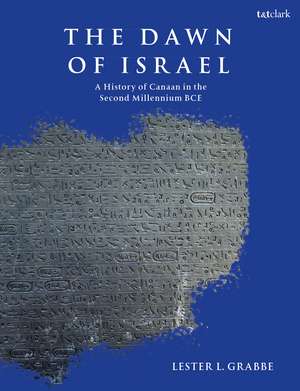The Dawn of Israel: A History of Canaan in the Second Millennium BCE
Autor Dr. Lester L. Grabbeen Limba Engleză Paperback – 14 dec 2022
| Toate formatele și edițiile | Preț | Express |
|---|---|---|
| Paperback (1) | 148.58 lei 3-5 săpt. | +29.42 lei 7-11 zile |
| Bloomsbury Publishing – 14 dec 2022 | 148.58 lei 3-5 săpt. | +29.42 lei 7-11 zile |
| Hardback (1) | 416.19 lei 6-8 săpt. | |
| Bloomsbury Publishing – 14 dec 2022 | 416.19 lei 6-8 săpt. |
Preț: 148.58 lei
Preț vechi: 160.24 lei
-7% Nou
Puncte Express: 223
Preț estimativ în valută:
28.43€ • 29.69$ • 23.48£
28.43€ • 29.69$ • 23.48£
Carte disponibilă
Livrare economică 25 martie-08 aprilie
Livrare express 11-15 martie pentru 39.41 lei
Preluare comenzi: 021 569.72.76
Specificații
ISBN-13: 9780567663214
ISBN-10: 0567663213
Pagini: 376
Dimensiuni: 189 x 246 x 23 mm
Greutate: 0.43 kg
Editura: Bloomsbury Publishing
Colecția T&T Clark
Locul publicării:London, United Kingdom
ISBN-10: 0567663213
Pagini: 376
Dimensiuni: 189 x 246 x 23 mm
Greutate: 0.43 kg
Editura: Bloomsbury Publishing
Colecția T&T Clark
Locul publicării:London, United Kingdom
Caracteristici
Using an exhaustively comprehensive approach, Grabbe draws on the disciplines of archaeology, history and anthropology to contribute to the current body of scholarship on ancient Israel
Notă biografică
Lester L. Grabbe is Professor Emeritus of Hebrew Bible and Early Judaism at the University of Hull, UK. He is founder and convenor of the European Seminar in Historical Methodology. He is also Series Editor of our own Library of Second Temple Studies Series.
Cuprins
AbbreviationsPrefacePart I: IntroductionChapter 1: IntroductionChapter 2: The Third Millennium Context Part II: Middle Bronze Age (c. 2000-1600 BCE)Chapter 3: Ancient Near Eastern ContextChapter 4: Syria and PalestinePart III: Late Bronze Age (c. 1600-1200 BCE)Chapter 5: Ancient Near Eastern Context, Including SyriaChapter 6: Palestine/CanaanPart IV: Early Iron Age (c. 1200-900 BCE)Chapter 7: Ancient Near Eastern Context, Including Syria and Transjordan (1200-900 BCE)Chapter 8: Palestine (1200-900 BCE)Part V: ConclusionsChapter 9: The Origins of Israel - A Holistic ApproachBibliographyIndex
Recenzii
Lester Grabbe has once again provided us with a well-researched and judiciously argued volume, this time laying out for us an excellent summary of the cultural backgrounds for the rise of 'Israel'. Masterfully weaving together historical, biblical and archaeological sources, Prof. Grabbe presents an overview of the cultural and historical background of 2nd millennium BCE Canaan and its environs, the region in which biblical Israel and Judah formed during the early Iron Age. Advanced students of archaeology, Bible and ancient Near Eastern Studies will find this an excellent resource to understand the genesis of Israel and Judah. Highly recommended!
Lester Grabbe worked through the History of Ancient Israel like an archaeologist, from the top strata down. Three volumes on the Persian and Hellenistic periods were followed by a by a magisterial study of the Iron Age monarchies, and now, finally, on Israel's beginnings in the Late Bronze Age. Both YHWH and Israel are first attested in this period. This fact is undeniable and calls for proper consideration, which it amply receives in the sober and comprehensive manner which we learnt to appreciate in Grabbe's previous books.
[Grabbe] enriches us with a seasoned, post-enlightenment history.
Lester Grabbe worked through the History of Ancient Israel like an archaeologist, from the top strata down. Three volumes on the Persian and Hellenistic periods were followed by a by a magisterial study of the Iron Age monarchies, and now, finally, on Israel's beginnings in the Late Bronze Age. Both YHWH and Israel are first attested in this period. This fact is undeniable and calls for proper consideration, which it amply receives in the sober and comprehensive manner which we learnt to appreciate in Grabbe's previous books.
[Grabbe] enriches us with a seasoned, post-enlightenment history.
